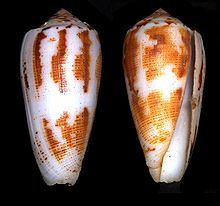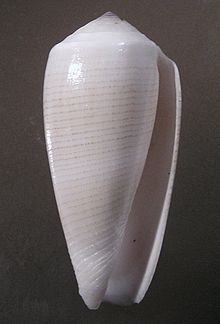- Conus magus
-
Pionoconus magus 
Dorsal (left) and ventral (right) views of a shell of Pionoconus magus Scientific classification Kingdom: Animalia Phylum: Mollusca Class: Gastropoda (unranked): clade Caenogastropoda
clade Hypsogastropoda
clade NeogastropodaSuperfamily: Conoidea Family: Conidae Subfamily: Coninae Genus: Pionoconus Species: P. magus Binomial name Pionoconus magus
Linnaeus, 1758Synonyms[1] - Pionoconus assimilis A. Adams, 1855
- Pionoconus boivini Kiener, L.C., 1845
- Pionoconus carinatus Swainson, 1822
- Pionoconus cernohorskyi da Motta, 1983
- Pionoconus circae G. B. Sowerby II, 1858
- Pionoconus consul Boivin, 1864
- Pionoconus epistomioides Weinkauff, 1875
- Pionoconus epistomium Reeve, 1844
- Pionoconus frauenfeldi Crosse, 1865
- Pionoconus fucatus Reeve, 1849
- Pionoconus fulvobullatus da Motta, 1982
- Pionoconus raphanus Hwass in Bruguière, 1792
- Pionoconus rollandi Bernardi, 1860
- Pionoconus signifer Crosse, 1865
- Pionoconus ustulatus Reeve, 1844
- Pionoconus worcesteri Brazier, 1891
- Pionoconus consul Boivin, A., 1864
- Pionoconus magus (Linnaeus, 1758)
- Pionoconus magus fulvobullatus (f) Motta, A.J. da, 1982
- Pionoconus metcalfii Reeve, L.A., 1843
Pionoconus magus, common name the magical cone, is a species of sea snail, a marine gastropod mollusk in the family Conidae, the cone snails and their allies.[1]
Like all species within the genus Conus, these snails are predatory and venomous. They are capable of "stinging" humans, therefore live ones should be handled carefully or not at all.
Contents
Description
The size of an adult shell varies between 16 mm and 94 mm. This common species is very variable in pattern and shade of coloring and embraces a large synonymy. The moderate spire is striate. The body whorl is long and rather cylindrical, closely striate below. The color of the shell is white, clouded with bluish ash, orange-brown, chestnut or chocolate, everywhere encircled by narrow chocolate interrupted lines, often separated into somewhat distant dots The middle of the body whorl is usually irregularly fasciate with white. The spire is tessellated with chestnut or chocolate. [2]
Venom use
Ziconotide is a chemical derived from the Conus magus toxin that acts as a painkiller with a potency 1000 times that of morphine. Discovered by Dr. Baldomero Olivera at University of Utah, it was developed for treatment of chronic and intractable pain caused by AIDS, cancer, neurological disorders and other maladies, and was approved by the U.S. Food and Drug Administration in December 2004 under the name Prialt.
Ziconotide works by blocking calcium channels in pain-transmitting nerve cells, rendering them unable to transmit pain signals to the brain. It is administered through injection into the spinal fluid.[3]
Distribution
This marine species occurs in the Red Sea and in the Indian Ocean along Madagascar and the Mascarene Basin. It is also found over a wide area of the Pacific Ocean from Indonesia to Japan and to the Marshall Islands, Wallis and Futuna and Fiji, but mainly centered on the Philippines.
References
- ^ a b Conus magus Linnaeus, 1758. Accessed through: World Register of Marine Species at http://www.marinespecies.org/aphia.php?p=taxdetails&id=215429 on 18 July 2011.
- ^ George Washington Tryon, Manual of Conchology vol. VI, p. 53; 1879
- ^ http://nihrecord.od.nih.gov/newsletters/2005/03_01_2005/story03.htm
- Vine, P. (1986). Red Sea Invertebrates. Immel Publishing, London. 224 pp
- Filmer R.M. (2001). A Catalogue of Nomenclature and Taxonomy in the Living Conidae 1758 - 1998. Backhuys Publishers, Leiden. 388pp
- Tucker J.K. (2009). Recent cone species database. September 4th 2009 Edition
- Tucker J.K. & Tenorio M.J. (2009) Systematic classification of Recent and fossil conoidean gastropods. Hackenheim: Conchbooks. 296 pp
External links
Categories:- Conus
- Animals described in 1758
Wikimedia Foundation. 2010.

